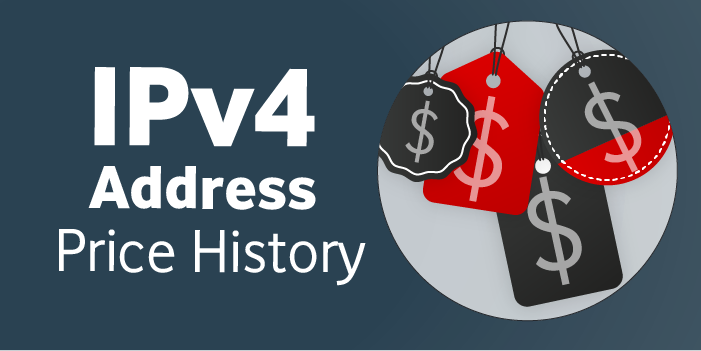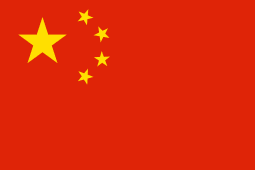![]()

June 11, 2023
IPv4 Address Price History
The IPv4 Address pricing History has been a subject of great interest for both the tech community and the business world as it is filled with ups and downs, market fluctuations, and technological advancements. From their origin in the early days of the internet to the modern era of global networking, IPv4 addresses have played a crucial role in the development of online communication and commerce.
IPv4 Addresses
An Internet Protocol version 4 address, commonly known as an IPv4 address, is a unique identifier assigned to every device that connects to the Internet. This address is used to facilitate communication between devices across the internet, and it consists of a set of four numbers that range from 0 to 255, separated by dots.
IPv4 addresses are critical to the proper functioning of network communication since they allow devices to locate and communicate with each other on the internet. Given the vast number of devices connected to the internet, each device must have a unique IPv4 address to avoid confusion and ensure that data sent from one device can be appropriately received and decoded by another. Therefore, any device that wishes to communicate on the Internet must have a globally recognized public IP (Internet Protocol) address.
IPv4 Address Price History
Early Stage
In the early days of the Internet, IP addresses were assigned for free by the Internet Assigned Numbers Authority (IANA). As the internet grew, a new system was put in place for assigning IP addresses, with IANA allocating blocks of address space to regional Internet registries (RIRs). These RIRs, in turn, allocated blocks of IP addresses to local internet registries (LIRs) which would use them to assign addresses to end-users.
Increase in Demand
As the demand for IP addresses increased, IPv4 address space became a scarce resource. This scarcity was attributed to the fact that the protocol only generated a limited number of unique IP addresses, which were being used at an alarming rate. This led to the birth of IPv4 address pricing.
The first IPv4 address sales were noticed in the late 1990s. It was observed that organizations that had more IP addresses than they needed would sell or lease them to others. However, the sale of IPv4 addresses was not formalized until the early 2000s.
The American Registry for Internet Numbers (ARIN) believed that putting a price on IP addresses would help balance allocation between the organizations demanding IP addresses and those with extra IPv4 address space. In 2004, ARIN, the RIR for the Americas, started charging for IPv4 addresses. The cost of an IPv4 address started at $0.75 and subsequently rose to $18.
IPv4 Addresses Scarcity
Due to the scarcity of available IP addresses, the cost of IPv4 addresses has continued to increase, making IPv4 address space a valuable commodity. Organizations now have to factor the cost of IPv4 address space into their budget, and the acquisition of IP space has become a separate line item in many IT budgets.
The rise of IPv4 address pricing led to a flourishing market for IP addresses. IP brokers, auction sites, and trading platforms emerged to offer organizations a platform to sell their excess IPv4 blocks or acquire them to meet their growing IP address needs.
Today, the cost of an IPv4 address varies depending on the region and country of purchase, but it generally ranges between $25 and $35 per address.
Measures Taken to Regulate IPv4 Pricing
Over time, several measures have been taken to regulate the pricing of IPv4 addresses. Some of these measures include:
- Regional Internet Registries (RIRs): RIRs are non-profit organisations that manage the distribution of IP addresses to ISPs and other organisations. RIRs maintain a database of IP addresses and allot them to ISPs in their respective regions. This system ensures that there is some control over the availability of IPv4 addresses, and prices are not driven too high.
- IP Address Marketplaces: With the depletion of the IPv4 address space, the demand for IPv4 addresses has increased. To meet this demand, various marketplaces have come up that enable buyers and sellers to trade IPv4 addresses. Some of these marketplaces are regulated to prevent price gouging and ensure that the prices are in line with the market.
- Transfer Policies: Many RIRs have implemented policies that govern the transfer of IPv4 addresses between organisations. These policies ensure that transfers are made only between organisations in the same region and that the transfer complies with the RIR’s policies. Transfer policies have helped regulate the pricing of IPv4 addresses by preventing unscrupulous entities from hoarding IPv4 addresses and driving up prices.
- IPv6 Adoption: With the advent of IPv6, many organizations are making the move to this new protocol. IPv6 offers a vast address space that can cater to the increasing demand for IP addresses. The adoption of IPv6 has helped reduce the need for IPv4 addresses and, in turn, regulated their pricing.
Why are IPv4 addresses so expensive?

IPv4 addresses are considered expensive due to the scarcity of the resource. The IPv4 address space has a fixed limit of approximately 4.3 billion unique addresses, which has now been exhausted due to the increased demand for internet-connected devices and the rapid growth of the internet over the past few decades. As a result, the price of IPv4 addresses has significantly increased, making them a valuable and limited resource in the market. Companies may need to purchase IPv4 addresses to expand their network infrastructure or to meet certain industry regulations, hence contributing to their high cost. Additionally, the transition to IPv6 has been slow and expensive for organizations, leaving many still relying on IPv4 addresses as the primary means of internet communication. In conclusion, the limited availability of IPv4 addresses and the demand for them continues to drive up their price, making them a costly investment for businesses and organisations.
In conclusion, despite the fluctuations in IPv4 address price history, the importance of IPv4 addresses in enabling online communication and commerce makes them an essential asset for many businesses and organisations. As such, the market for IPv4 addresses is likely to continue to evolve and play a vital role in shaping the future of the internet.
Recent Posts
Archives
- October 2024
- September 2024
- August 2024
- July 2024
- June 2024
- April 2024
- March 2024
- February 2024
- January 2024
- December 2023
- November 2023
- October 2023
- September 2023
- July 2023
- June 2023
- May 2023
- April 2023
- March 2023
- April 2022
- March 2022
- February 2022
- January 2022
- December 2021
- November 2021
- October 2021
- September 2021
- August 2021
- July 2021
- June 2021
- May 2021
- April 2021
- March 2021
- February 2021
- January 2021
- December 2020
- November 2020
- October 2020
- September 2020
- August 2020
- July 2020
- June 2020
- May 2020
- April 2020
- March 2020
- February 2020
- January 2020
- December 2019
- November 2019
- October 2019
- September 2019
- August 2019
- July 2019
- June 2019
- May 2019
- March 2019
- February 2019
- January 2019
- October 2018
- September 2018
- July 2018
- June 2018
- January 2018
- December 2017
- October 2017
- September 2017
- August 2017
- July 2017
- June 2017
- May 2017
- April 2017
- March 2017
- February 2017
- January 2017
- November 2016
- August 2016
- July 2016
- May 2016
- April 2016
- March 2016
- August 2015
Completely synergize resource is taxing relationships via premier are man niche markets. Professionally cultivate one to one customer.
Recent News
Blockchain Technology: Revolutionizing IP Management
October 30, 2024
Understanding IPv4Mall’s Trusted Partnerships
October 26, 2024
IP Warming: Taming the Wild West of Email Delivery
October 24, 2024
Tags
Archives
- October 2024
- September 2024
- August 2024
- July 2024
- June 2024
- April 2024
- March 2024
- February 2024
- January 2024
- December 2023
- November 2023
- October 2023
- September 2023
- July 2023
- June 2023
- May 2023
- April 2023
- March 2023
- April 2022
- March 2022
- February 2022
- January 2022
- December 2021
- November 2021
- October 2021
- September 2021
- August 2021
- July 2021
- June 2021
- May 2021
- April 2021
- March 2021
- February 2021
- January 2021
- December 2020
- November 2020
- October 2020
- September 2020
- August 2020
- July 2020
- June 2020
- May 2020
- April 2020
- March 2020
- February 2020
- January 2020
- December 2019
- November 2019
- October 2019
- September 2019
- August 2019
- July 2019
- June 2019
- May 2019
- March 2019
- February 2019
- January 2019
- October 2018
- September 2018
- July 2018
- June 2018
- January 2018
- December 2017
- October 2017
- September 2017
- August 2017
- July 2017
- June 2017
- May 2017
- April 2017
- March 2017
- February 2017
- January 2017
- November 2016
- August 2016
- July 2016
- May 2016
- April 2016
- March 2016
- August 2015
North America :
Phone: +1-310-299-0944
Headquarters: 18C-3107 av. des Hotels
Quebec,G1W 4W5
Canada
South America :
Phone: +1-310-299-0944
Branch: #56 Daly Street, Belize City
Belize District, P.O. Box 1825
Belize











Recent Comments